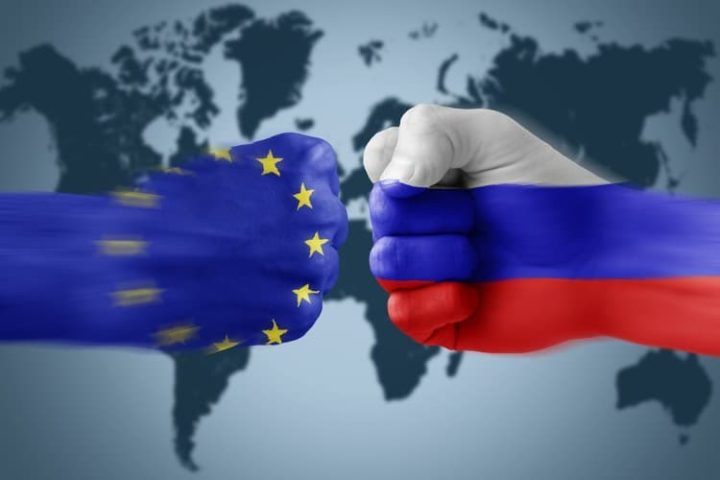
During a Forum Europa gathering in Brussels on April 9, the EU High Representative for Foreign Affairs and Security Policy, Josep Borrell, posited that a full-scale military conflict in Europe has become more likely owing to the West’s faceoff with Russia.
In his speech, the EU’s top diplomat alleged that the “possibility of a high-intensity conventional war in Europe is no longer a fantasy” and that the bloc must “do everything to avoid it.”
Borrell slammed Russia for being a growing threat to the continent, citing Moscow’s conflict with Kyiv, and accused Moscow of trying to destabilize the EU:
Even though Ukraine is not yet a member of the European Union, the war against Ukraine is a threat to the Union as a whole. We cannot dissociate the fate of the Ukrainian people from the fate of the European Union people, especially since Putin is determined to extend its destabilizing activities to the whole Union. To destabilize societies is not only made by bombing. You will see in the next European elections how Russian destabilization will be threatening our democracy. But the prospect, the possibility of a high intensity conventional war in Europe is no longer fantasy.
As per Borrell, although a military conflict in Europe is not imminent and “not going to start tomorrow,” citizens should understand that the “US umbrella that has protected us during the Cold War and after, may not be open all the time.”
“Maybe, depending on who is ruling Washington, we cannot rely on the Americans’ support and American capacity to protect us,” he said, presumably alluding to a possible Donald Trump presidency.
In the same speech, Borrell urged EU member states to become more self-sufficient with their security and to increase defense spending, claiming that the EU is encircled by a “ring of fires”:
We need more intergovernmental cooperation. We have done something, such as the European Peace Facility for example, which has created a very positive dynamic in favor of Ukraine. There is a huge potential of increasing defense cooperation among Member States.
The EU diplomat elaborated that while NATO is as “irreplaceable” as ever, Europeans should start creating their own “pillar” within the U.S.-led bloc, adding:
I think that a European Strategic Responsibility is the best way to strengthen NATO, because NATO cannot remain credible unless its Members increase their military credibility, unless we increase our credibility.
Strikingly, Borrell conceded that many non-Western countries do not agree with Brussels’ position on the conflicts in Gaza and in Ukraine:
What is happening in Gaza has portrayed Europe in a way that the rest of the world does not understand. And also when it comes to the war against Ukraine, many people around the world have had some difficulties understanding what is going on.
In his speech, the diplomat also alluded to his recent meeting with Ukrainian Foreign Minister Dmytro Kuleba when the latter requested seven Patriot batteries to combat Russia. On April 10, Borrell posted on X that he again talked to Kuleba about EU attempts to expedite military aid to Ukraine, especially in the fields of “air defense systems and ammunition.”
Borrel’s remarks came amid speculation from various Western civilian and military officials in recent months that Russia could attack NATO within a few years. For instance, in February this year, Denmark’s defense minister Troels Lund Poulsen contended that Russia could attack a NATO country in as little as three years, echoing similar remarks made by his counterparts in countries like Sweden, the U.K., Romania, and Germany.
“It cannot be ruled out that within a three- to five-year period, Russia will test Article 5 and NATO’s solidarity. That was not NATO’s assessment in 2023. This is new information that is coming to the fore now,” Jyllands-Posten, a Danish newspaper, cited Poulsen as saying.
“There is reason to be genuinely concerned,” added Poulsen. “Russia’s capacity to produce military equipment has increased tremendously…. Russia potentially has the will to [launch attacks]. Now they can also have the ability in terms of military capability earlier than we expected.”
On the other side of the Atlantic, in an interview with Spanish-language broadcaster Univision that aired April 9, U.S. President Joe Biden boasted that the recent inclusion of Finland and Sweden in the U.S.-led NATO in the wake of the ongoing conflict in Ukraine was a huge achievement of his career:
We’ve done something that I was very proud of. I’ve engaged with NATO for my whole career. We were able to expand NATO, and we have two thousand miles of border because you have two Nordic nations having joined NATO. You have a whole range of NATO countries along the Russian border.
Biden lambasted former U.S. President Donald Trump, calling him a “dictator” while alluding to the Capitol “insurrection” by Trump supporters on January 6 2021:
Seriously. Donald Trump uses phrases like we’re going to eviscerate the Constitution. He’s going to be a dictator on day one.
Washington has earmarked over $113 billion for aid to Ukraine since the eruption of Russo-Ukrainian tensions in February 2022. For almost 20 years, Russian President Vladimir Putin has been sounding the alarm that, although NATO’s policies of expanding closer to Russian borders jeopardize Russian national security, a real “red line” for Russia would be an attempt to move NATO troops into Ukraine.
Meanwhile, in an interview with Channel One Russia on April 11, Russian Foreign Ministry Spokeswoman Maria Zakharova slammed International Olympic Committee (IOC) President Thomas Bach for being a “conductor” of an anti-Russia campaign in sports.
Formerly, Bach had divulged to pranksters on a call that Ukrainians were tasked with conducting espionage activities on Russian athletes so that the latter could be prevented from taking part in the Paris Olympic Games.
“It’s Thomas Bach who has become the conductor of the entire anti-Russian fuss inside the Olympic establishment,” Zakharova decried. “In my view, all these statements are sensational. It’s clear that all of this requires a public inquiry and a journalistic investigation, as well as a probe within [the IOC],” she elaborated.



